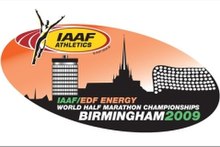2009 IAAF World Half Marathon Championships
 |
|||
| Host city |
Birmingham, England, United Kingdom |
||
|---|---|---|---|
| Nations participating | 39 | ||
| Athletes participating | 157 | ||
| Events | 2 | ||
| Dates | 2009-10-11 | ||
| Race length | 21.0975 kilometres | ||
| Individual prize money (US$) | 1st: 30,000 2nd: 15,000 3rd: 10,000 4th: 7,000 5th: 5,000 6th: 3,000 |
||
| Team prize money (US$) | 1st: 15,000 2nd: 12,000 3rd: 9,000 4th: 7,500 5th: 6,000 6th: 3,000 |
||
|
|||
The 2009 IAAF World Half Marathon Championships was held in Birmingham, United Kingdom on 11 October 2009. It was the final event of the International Association of Athletics Federations' 2009 World Athletics Series.
The city of Birmingham was selected by the IAAF Council after a presentation by UK Athletics and the Birmingham City Council. It was the third time the championships were held in Great Britain, after the 1992 event on Tyneside and the 2001 edition in Bristol. A number of events were scheduled to coincide with the Championships: a three-day convention for Association of International Marathons and Distance Races, as well as an IAAF press conference to discuss the future and progression of the sport.
In addition to the main World Championship races, the Birmingham Half Marathon started thirty minutes after the women's World Championship race. Organised by Birmingham City Council and sponsored by EDF Energy, it was the second edition of the mass race which attracted over 9000 runners in 2008. A total of 12,068 people signed up to run the Birmingham Half Marathon.
A total of 47 IAAF member federations sent athletes to the championships, the highest number since the 2002 edition.
The men's race and women's race started at BST 9.00 am and 9:30 am, respectively. The course passed through Birmingham city centre and the city's southern suburbs, Centenary Square acting as the start and end point of the race. Highlights along the route included Cannon Hill Park, Cadbury World and the Bournville model village, Edgbaston Cricket Ground, Victoria Square and the Bull Ring. The course is largely straight and flat, although there is an abrupt descent and ascent at the start and finish of the route, and slight rises and falls between the 10 and 16 km marks around Selly Park.
...
Wikipedia
